

Words I Never Want to See in Your Novel. Please. Plot Whisperer for Writers and Readers. Twain's Rules of Writing. 25 Things Every Writer Should Know. A Simple Novel Outline - 9 questions for 25 chapters & H.E. Roulo - StumbleUpon.
Just as every tree is different but still recognizably a tree, every story is different but contains elements that make it a story.
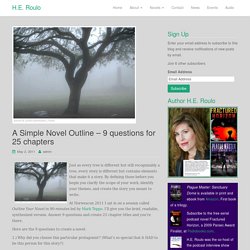
By defining those before you begin you clarify the scope of your work, identify your themes, and create the story you meant to write. At Norwescon 2011 I sat in on a session called Outline Your Novel in 90-minutes led by Mark Teppo. I’ll give you the brief, readable, synthesized version. Answer 9 questions and create 25 chapter titles and you’re there. Here are the 9 questions to create a novel: 1.) 11 Goal Hacks: How to Achieve Anything — PsyBlog - StumbleUpon. Goal-setting research on fantasising, visualisation, goal commitment, procrastination, the dark side of goal-setting and more… We’re all familiar with the nuts and bolts of goal-setting.
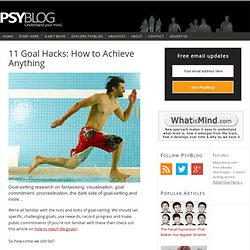
We should set specific, challenging goals, use rewards, record progress and make public commitments (if you’re not familiar with these then check out this article on how to reach life goals). So how come we still fail? This psychological research suggests why and what mindsets should help us reach our goals. 1. The biggest enemy of any goal is excessive positive fantasising. Ten Steps for Boosting Your Creativity. Mindmap. 42 Essential 3rd Act Twists. How fiction can change reality - Jessica Wise. How to Read a Book was first written in 1940.
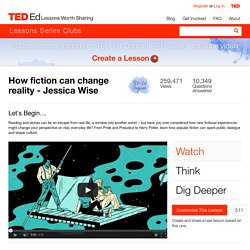
It elaborates on ways to effectively read books from several different genres. It was revised in the 1970's to include a list of the top books you should read. Take a look to see how many of the books on the list you have read. An article on how to become an author. Library of Congress is the research library of the United States Congress, de facto national library of the United States of America, and the oldest federal cultural institution in the United States. What makes a hero? - Matthew Winkler. The Hero Archetype in Literature, Religion, and Popular Culture: (along with a useful PowerPoint presentation teachers can download at this URL: )Maricopa Center for Learning and Instruction (users embark on their own hero's journey): American Masters Lesson from PBS for Teachers on George Lucas, the Power of Myth, and the Hero's Journey: an interactive approach to the Hero's Journey: of course, information about Joseph Campbell's works on the subject, on the Joseph Campbell Foundation site:The Hero With A Thousand Faces Hero's Journey (semi-biographical film): the stories of (a) Odin hanging from the world tree, Yggdrasil, (b) the Buddha seated under the Bodhi Tree, and (c) the crucifixion of Jesus Christ.

Do all of these religious episodes follow the pattern of the hero’s journey? Find a comparable story from another continent. Does it follow the hero’s journey pattern? Twenty Rules of Thumb for Creativity. Twenty Rules of Thumb for Creativity 1.
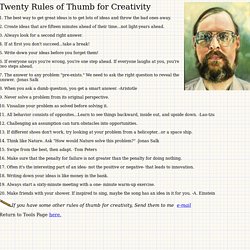
The best way to get great ideas is to get lots of ideas and throw the bad ones away. 2. How To Lead A Creative Life [Infographic] [Close Window]
![How To Lead A Creative Life [Infographic]](http://cdn.pearltrees.com/s/pic/th/creative-infographic-company-19379827)
Creative Gibberish. Divergent thinking – more than a mere tool – is a technique very commonly used on creative activities because it allows us to expand our brains a little bit, by looking for new opportunities and ways of getting things done.
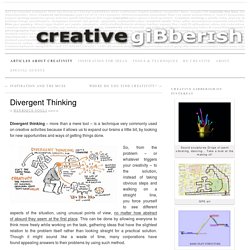
So, from the problem – or whatever triggers your creativity – to the solution, instead of taking obvious steps and walking on a straight line, you force yourself to see different aspects of the situation, using unusual points of view, no matter how abstract of absurd they seem at the first place. This can be done by allowing everyone to think more freely while working on the task, gathering ideas that have the slightest relation to the problem itself rather than looking straight for a practical solution.
Though it might sound like a waste of time, many corporations have found appealing answers to their problems by using such method. Another misconception around the divergent thinking is that the creative process should be all about it. Geek vs. Nerd: The Infographic. Perfecting Your First Page: 3 Tasks or Exercises. Delacroix, Faust Trying to Seduce Margarete (detail) Over the weekend, I was a speaker at the Missouri Writers Guild conference (a terrific group of people and an impeccably run event).
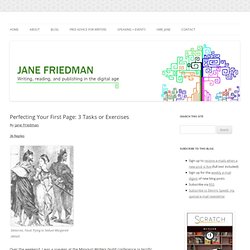
One of my sessions focused on evaluating the first page of your novel or memoir manuscript. Here are 3 of the best exercises or tasks you might undertake when thinking about your first page and how you can improve it before sending it to agents or editors. What is the absolute latest moment in the manuscript you can begin your story, and still not leave out anything that’s critical to the story problem? Inspiring Picture Quotes. 36 Tips for Writing Just About Anything. Basic tips for writing just about anything.
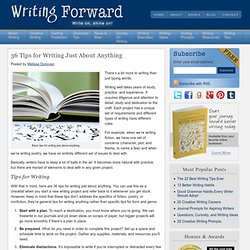
There’s a lot more to writing than just typing words. Writing well takes years of study, practice, and experience. Top 10 Sentence Slip-Ups. Good writing comes down to two totally different factors: solid prose and “it.”

The latter is that special something that brings stories to life, infuses vibrancy into characters and themes, and just basically makes stories work. But an author who has been blessed with all the “it” in the world still won’t make it if he isn’t also able to convey the essence of his genius in well-ordered, properly structured sentences and paragraphs. Creating correct sentences is a technical process that offers set guidelines for getting the structure right. Make Your Writing Stronger. We are all apprentices in a craft where no one ever becomes a master. ~Ernest Hemingway How strong is your writing? Book Ideas for Young Writers. 10 Laws of Productivity. You might think that creatives as diverse as Internet entrepreneur Jack Dorsey, industrial design firm Studio 7.5, and bestselling Japanese novelist Haruki Murakami would have little in common.
In fact, the tenets that guide how they – and exceptionally productive creatives across the board – make ideas happen are incredibly similar. Here are 10 laws of productivity we’ve consistently observed among serial idea executors: 1. Break the seal of hesitation. A bias toward action is the most common trait we’ve found across the hundreds of creative professionals and entrepreneurs we’ve interviewed. 30 Things to Stop Doing to Yourself.
60 insane cloud formations from around the world [PICs] Cloud varieties go way beyond the cumulus, stratus, and cirrus we learn about in elementary school. Check out these wild natural phenomena. STANDING IN A CORNFIELD IN INDIANA, I once saw a fat roll cloud (like #4 below) float directly over my head. It’s a 12-year-old memory that remains fresh. There was a moment of mild panic just as the cloud reached me — Is this what a tornado looks like right before it hits?
I thought. 23 incredible new technologies you’ll see by 2021. Behavior, Bird Identification Skills, Bird ID. 33 Ways To Stay Creative. Writing Meaningful Description. A Collection Of “The Best…” Lists On Writing. How to Stay Inspired (for Writers and Artists): 12 steps (with pictures) Fifty (50!) Tools which can help you in Writing - Stepcase Lifeh. Themes & Things To Keep In Mind When Writing Fantasy Stories and Adventures » Daily Encounter. This list is far from complete. 73 Ways to Become a Better Writer.
Strategy List: 35 Dimensions of Critical Thought. S-1 Thinking Independently Principle: Critical thinking is independent thinking, thinking for oneself. Tone/Attitude Words. Words I Never Want to See in Your Novel. Characterisation. How to write convincing characters Characterisation - the task of building characters - isn't easy. Howstuffworks "How Knights Work" 25 Things You Should Know About Character - StumbleUpon. Previous iterations of the “25 Things” series: 25 Virtues Writers Should Possess. How to Flesh out a Country or Region in Your Fantasy RPG World -
Edit Article. The Thing About Sub-Plots. The Thirty-Six Dramatic Situations. The 10 Types of Writers' Block (and How to Overcome Them) 5 Ways To Add Sparkle To Your Writing. Write Fiction that Grabs Readers from Page One. The 4 Story Structures that Dominate Novels. How to Make Your Novel a Page Turner. An anti-hero of one’s own - Tim Adams. A Simple Novel Outline – 9 questions for 25 chapters « H.E. Roulo.